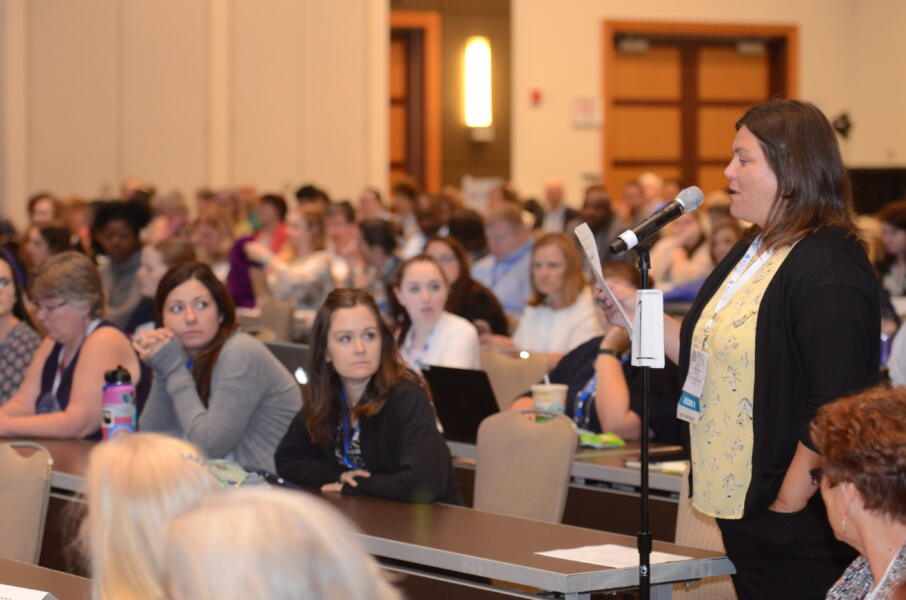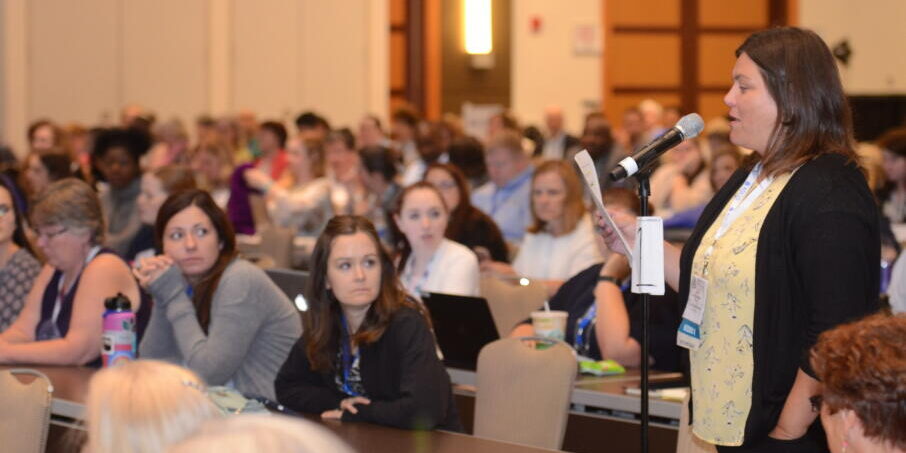Julie Bayer-Vile, MS, MLS(ASCP)CMSCCMMBCM
 |
| Delegates to the ASCLS House of Delegates (HOD) discuss Society business and governance that is voted on by the HOD during the 2018 Annual Meeting in Chicago. |
Having been a member of ASCLS for almost five years now, I’ve had the privilege of attending and serving as a delegate for my state society at two ASCLS Annual Meetings. Ensuring that the voices of all our members and constituent societies are heard is a priority to the ASCLS Board of Directors and is a key element to the continued forward progress of the Society. In the face of adversity and a changing demographic of our members, and our field in general, it is more important than ever that ASCLS finds a way to stay relevant and adapt to meet the needs of our members. The next step in our organizational evolution should be a restructuring of our Society voting process.
Time for a New Voting Process
As it exists now, our voting structure is such that only people who attend the Annual Meeting, and are credentialed as delegates through their state, can have their voices heard through voting in the House of Delegates (HOD). As tuition and student debt are increasing and salaries not keeping pace, younger members may have more difficulty attending our meetings. I for one have never had an employer who would give me educational PTO for even a state meeting, let alone any kind of PTO or financial support for a national meeting. By precluding the voices of members unable to attend, we are not representing the diversity of our membership in important business matters.
In 2018 only about 3 percent of our membership were credentialed delegates on the floor during the meeting. As a result, the direction of our Society is more driven toward the views of those who are in attendance. As a younger member, this is discouraging. My voice and my thoughts aren’t any less worthy because I’m not able to attend the meeting every year. Part of the ASCLS mission defines ASCLS as “an organization where all persons can engage and participate in a meaningful way.” If we, as an organization, are going to make this statement, then we need to stand behind it and make the changes needed so all of our members have the opportunity to be engaged.
Regional Director Elections
Along with changing the voting process, we also need to evaluate the way we elect regional directors. As a member of Region II, I should not be voting for the director of any other region. As a member of my region, I am familiar with the needs of my state and the needs of the states in my region. I am not, for example, familiar with the needs of Colorado or Florida. It’s not my place to vote on a director when I don’t know what the region’s states need in terms of regional leadership. Similarly, I don’t want someone from another state voting on my regional director.
The candidate who wants to be the director of my region should be campaigning to me and telling me what they’re going to do to better my state and my region. I don’t want them to be concerned with courting the votes from anyone else. Their focus and constituency should be entirely their region. I don’t feel that it’s in the best interest of any state or region to have the regional directors voted on by all delegates. Just as I don’t vote for a senator from another state, I shouldn’t be voting for a director for another region.
Eliminate the Delegate Structure
There are changes we can make to better represent our organization and our diversity. We should eliminate the delegate structure. All dues paying members have the right to be voting members in the Society and should be allowed the opportunity. We should also move to an anonymous online voting system with live stream of the HOD meeting, which should be renamed to reflect that it is a business meeting. Other professional healthcare organizations, including the American Association for Clinical Chemistry and the American Association of Physicists in Medicine, conduct their voting online.
This meeting still provides a great deal of value and discussion for voting. By live streaming the meeting, it allows for virtual attendance and interaction by those unable to make the meeting. Voting, on some matters, can still happen during the business meeting and can be conducted through an online balloting system. We use online voting for regional directors already, so the same can be put into place for business voting. Allowing all members this opportunity is empowering and I believe fosters a stronger feeling of ownership and investment in the Society.
Disrupt the Status Quo
For as strong a voice as ASCLS is for the clinical laboratory profession, we can do better. Some of our operating procedures are antiquated and do not foster engagement with younger members, and this is a prime example. I believe if we are going to continue to survive, and thrive, we need to adapt to the environment we’re in now, not the environment of 20 or 30 years ago.
Sometimes, disrupting the status quo is the best way to make progress. All members deserve to have their voices heard. By making the Society, and our decision making, more transparent and accessible, we’re going to empower our members to be more involved and more invested in the future of the Society. Improving accessibility includes meeting our members where they are in their lives, personally and professionally. But, as the structure stands now, I feel that voting is a privilege for those able to afford to attend a meeting, not a right afforded to all dues paying members. I pay the same dues as every member in the Society. Whether I can attend a meeting or not, for whatever reason, should not limit the weight of my voice. We should all have the right, and opportunity, to have our voices heard.
Julie Bayer-Vile is the cancer conference coordinator at CJW Medical Center in Richmond, Virginia, and an incoming master’s in genetic counseling student at Virginia Commonwealth University.
